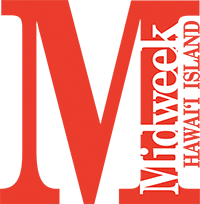The Difference Maker
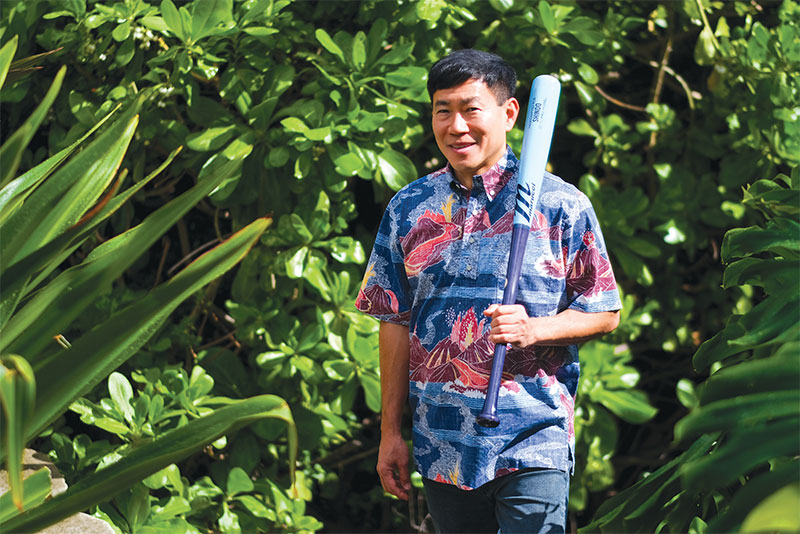
Whether in global financial markets or on baseball fields, businessman Dustin Shindo has proven that he’s got game.
As prominent a business leader as Dustin Shindo is, even he gets lost in the shadows of others at times.
This includes the eclipse cast by his own 12-year-old son, Tyler — the switch-hitting ambidextrous pitcher who excelled on the baseball diamond last summer in leading Honolulu Little League to the West Regional championship in San Bernadino, California.
But while the youngster was making magic on the baseball field, Shindo was busy accomplishing something quite remarkable as well — just in another field, and without any fanfare.
What he did was successfully launch Hawai‘i’s first-ever special purpose acquisition company, or SPAC, which is essentially a nonoperational company that exists solely to raise capital.
It’s a feat that often only investors within global financial markets can truly appreciate.
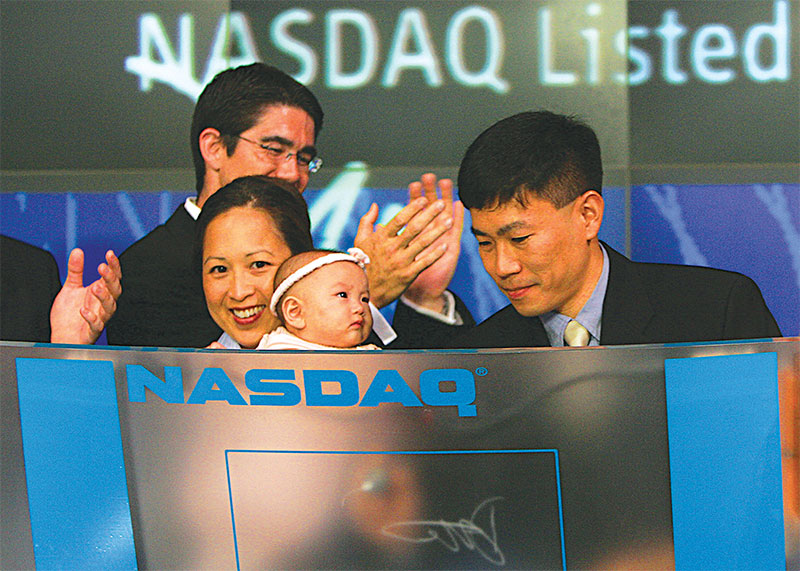
In 2007, Dustin Shindo celebrates the opening of the Nasdaq stock market in Times Square, New York City, with wife Jamie, daughter Brooke, and Hoku Scientific business partner Karl “Kaleo” Taft.
In recalling those summer days that overflowed with baseball and business highs, Shindo says, “I’d go and watch Tyler’s games during the day, then I’d stay up all night working on this SPAC. We finished the initial public offering the same day that my son was on national TV.
“So, everyone knew about him, but nobody knew about the SPAC.”
They do now.
By helping to found Pono Capital Corp., Shindo was able to complete its listing on Nasdaq in August and begin public trading under the ticker symbol “PONO.” As a result, the company raised a whopping $115 million — all of which sets up Shindo, its CEO, to finance a merger with a private company — likely one in the disruptive technology sector — in the coming months.
Although admittedly interested in “blank check companies” for years, Shindo resisted taking the plunge into SPACs because turning private ventures into publicly traded companies wasn’t conventional.
“The best companies wouldn’t use SPACs before,” he explains. “But a couple of years ago that changed and it started to become well-accepted on Wall Street with companies like DraftKings.
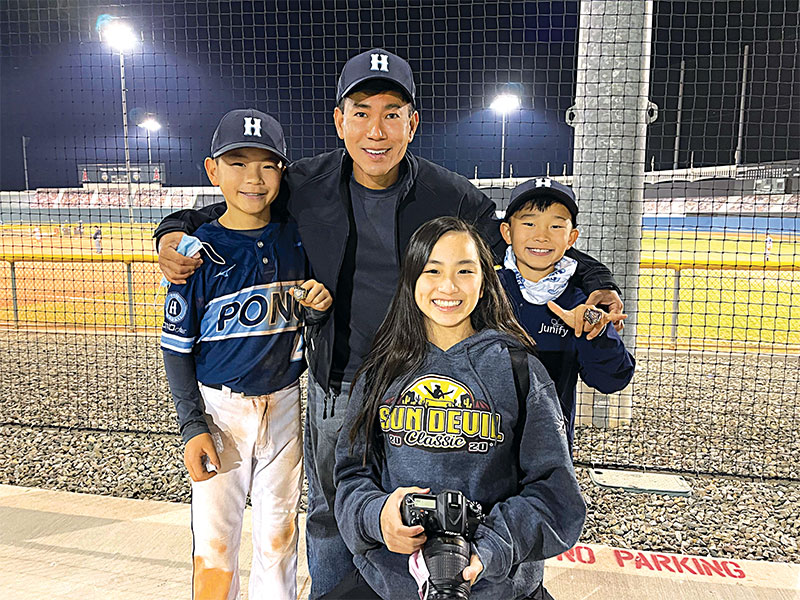
Baseball is an important part of Shindo’s life. Here, he attends a tournament held last December at Cactus Yards in Arizona with sons Tyler, 12, Sean, 10, and daughter Brooke, 15. PHOTOS COURTESY DUSTIN SHINDO
“Now, it’s used as a more mainstream way to go public.”
The ambitious Shindo — who also serves as CEO of Junify Corp., a Palo Alto-based startup that specializes in cloud access security software — has always prided himself in being a difference maker, and this latest accomplishment only cements his standing as a pioneer in the local business community. But what he’s especially proud of is how the birth of Hawai‘i’s first SPAC could improve the way outsiders view doing business in the islands.
“When you go out to the rest of the world to try and raise money or do deals, there’s always this feeling that Hawai‘i is just a tourist thing,” notes Shindo, whose extensive business background includes founding the drug development company Pono Corp. and its health care subsidiaries. “So, anytime anyone can do something like this, it helps in changing some of those perceptions and that makes it better for the next generation, or for the next person who goes out and does it. People will start thinking, ‘Hey, I can do it, too!’”
Not surprisingly, Shindo is as comfortable talking about home runs, pop-flies and strikeouts as he is discussing profit margins, returns on investment and balance sheets. Last month, he was named Hawai‘i state director for Perfect Game, the largest baseball scouting service in the world and one that hosts youth baseball and softball events in 35 states.
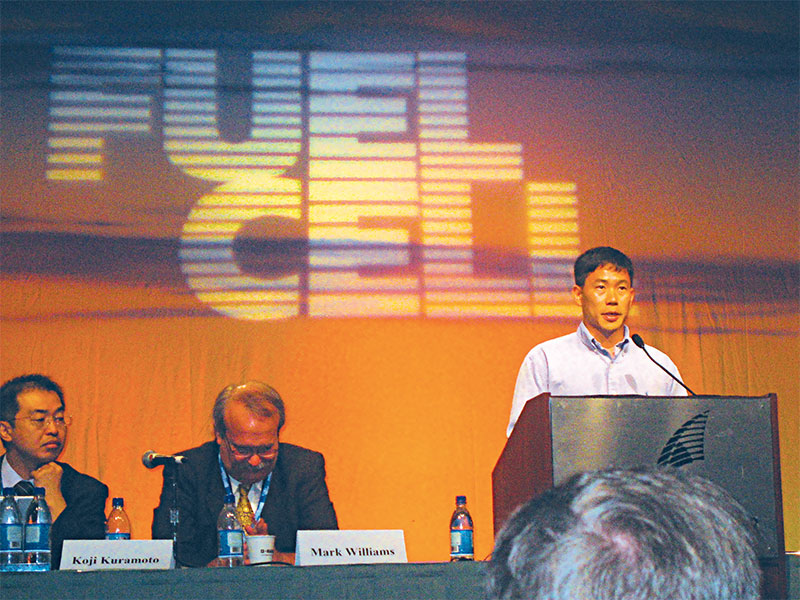
The ever on-the-go businessman, shown here addressing the audience during the Fuel Cell Conference in Germany in 2006, will be looking to complete the process for his first-ever special purpose acquisition company in 2022.
In choosing to volunteer for the position, Shindo gave the national organization every reason to finally set up shop in the islands — a boon for local players because it greatly expands the world of Hawai‘i baseball.
“Almost every U.S.-born player that’s in the major leagues has at one point played in Perfect Game. It’s the avenue to be seen by college and professional scouts,” explains Shindo, who in 2018 created the nonprofit Hawai‘i Youth Baseball Association, which has since been renamed Perfect Game Hawai‘i.
“Now think about what this all means for a Hawai‘i baseball player. It means you don’t have to fly to the mainland every time you want to be seen at a tournament or showcase. There are some players who can afford to do that, but what about everyone else?” he asks. “So, we needed a way to bring more (exposure) to Hawai‘i so that more players could be seen than otherwise would be.”
Shindo, who grew up on the Big Island playing baseball and soccer, is especially excited about debuting the Perfect Game Pacific Baseball Championship in the islands next July. It will be the first of what he hopes is many premier tournaments to be staged in the state.
“What makes this tournament different is that all the data for the kids is integrated into the Perfect Game system. So, anytime a player goes up and hits a home run or pitches a good inning, the information gets captured into the system, which means that all of the scouts and all of the people watching across the country can see and sift through it,” he explains.
In the late 1800s, Shindo’s great-grandfather, Katsuichi Shindo, started Hilo Soda Works — a Pepsi Cola distribution business that the family operated for generations. Naturally, as a product of entrepreneurial stock, Shindo was expected to contribute to the business from a young age, and that included learning to wash tanks and deliver soft drinks.
“My parents worked hard, and they put me to work early on,” he acknowledges.
But soon after returning home from college (he received his bachelor’s degree in accounting from the University of Washing-ton and his master’s in business administration from the University of Virginia), Shindo was shocked to discover the Hilo operation was about to be sold to a mainland company.
“It happened three months after I got back from college,” he recalls. “At the time, I was pretty disappointed since (continuing to work there) was obviously my plan.”
The regret was short-lived, however, as circumstances would lead him down a path of new opportunities. In the mid-’90s, he launched Mehana Brewing Co., and followed that up by starting the renewable energy venture Hoku Scientific in 2001.
“Hoku was a hydrogen/fuel/ cell component company that also did solar, and we took it public on Nasdaq in 2005,” he recalls. “In a period of 10 years, I raised about a half-billion dollars in capital through various sources, and we were even able to build a big plant in Idaho.
“I thought we would help the environment through the company, and I believe we did because if you look around (Honolulu), there are solar systems all over the place that we were involved in,” says Shindo, adding that business was eventually sold during the financial crisis in 2009.
In recent years, Shindo has chosen to invest much of his time in philanthropic pursuits. Beyond his baseball nonprofit, he’s also helped establish the Calvin Shindo Student Venture Fund at University of Hawai‘i at Mānoa, a program that’s named after his father and one that allows students to act as early-stage venture capitalists while learning to make important investment decisions; and the Big Island-based Community First, which features a number of programs aimed at improving community health and wellness.
“A lot of the nonprofit work I do is just for the greater good,”
he says. “I don’t get paid, so for me it’s just about making a difference. Early on, I chose to focus on businesses that would help and that I hoped would be meaningful, whereas now there’s more of a balance between that and the nonprofits.”
Like many, the prominent businessman expects better days ahead following the global turbulence of the past two years. Part of that confidence stems from his belief that a merger with another company will happen in the coming year, and thus officially complete his first-ever SPAC.
“Hopefully, there will be some benefit for Hawai‘i,” Shindo says. “It’s also possible I might do (another SPAC) again.”
More importantly, he believes his nonprofits will continue to flourish and enhance the lives of many. He’s positive that the presence of Perfect Game in the islands will increase the number of college scholarship offers to “a broader range of kids,” and looks forward to hearing more “inspiring stories” from Calvin Shindo Venture Fund participants — specifically, how the program has “positively” impacted their lives.
“I really hope to hear more of that in the coming year,” Shindo says in finalizing his wish list for 2022. “That would make me feel like this has all been worth it.”
